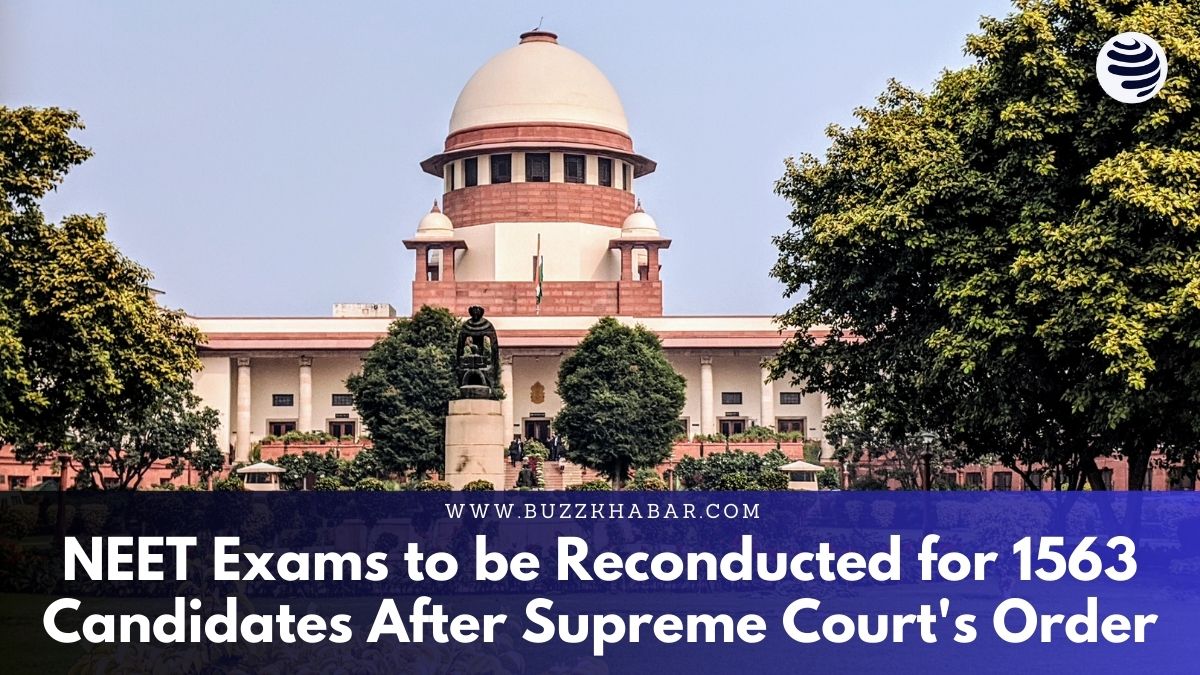
Subscribe to BuzzKhabar Newsletter
Enter your email address below and subscribe to our newsletter.

Enter your email address below and subscribe to our newsletter.

Updated on July 4, 2024 1:40 pm
In a significant turn of events, the Supreme Court has intervened in the ongoing National Eligibility cum Entrance Test (NEET) grace marks controversy. On June 13, the court ordered a reexamination specifically for 1,563 students who had initially received grace marks in NEET Exam due to anomalies in the examination process. This decision underscores the judiciary’s commitment to ensuring fairness in one of India’s most critical medical entrance exams.
Here’s a comprehensive breakdown of the events and implications of this ruling.
The matter surfaced when discrepancies related to the allocation of grace marks in NEET-UG were brought before the Supreme Court. These issues were primarily centered around specific examination centers where candidates faced unusual challenges that potentially impacted their performance. Recognizing the gravity of the situation, the court deliberated on ensuring that the integrity of the examination process remains uncompromised.
Justices Vikram Nath and Sandeep Mehta presided over the case and emphasized the need for a transparent resolution. The court’s decision came after the National Testing Agency (NTA) proposed a reexamination for the affected candidates to rectify the previous errors. This move, though aimed at fairness, was met with mixed reactions, as it posed a direct impact on the students’ preparation and future plans.
During the proceedings, the central government and the NTA highlighted their steps to address the concerns raised by the petitioners and other stakeholders. Meetings held on June 10, 11, and 12 led to the decision to nullify the scores of 1,563 candidates and schedule a retest. The NTA specified that the retest aims to provide a level playing field for all aspirants, ensuring that the scores reflect their actual performance without the cushion of grace marks.
The Supreme Court has directed that the retest for the 1,563 affected candidates will take place on June 23, with results to be announced before June 30. This schedule is particularly crucial as it aligns with the upcoming counseling sessions set to begin in early July. The NTA reassured that the retest would not delay the overall admission process for the academic year.
An important aspect of the Supreme Court’s decision is the directive concerning students who choose not to take the retest. For those 1,563 candidates, if they decide against appearing for the reexamination, their previous results will be re-evaluated without the grace marks initially awarded. This means that their scores will be adjusted to reflect their actual performance in the NEET exam, minus the grace marks.
This judicial decision is a testament to the rigorous scrutiny employed in overseeing competitive exams that determine the career paths of thousands of students nationwide. It also sets a precedent for handling similar issues in the future, emphasizing the importance of transparency and equity in academic assessments.
The NEET grace marks issue has brought to light the complexities involved in conducting large-scale examinations. The Supreme Court’s ruling not only aims to rectify the immediate discrepancies but also reinforces the broader principles of justice and fairness in educational assessments. As the affected students prepare for their retest, the educational community watches closely, hoping that such issues will be fewer in the future, ensuring that every candidate’s hard work is accurately reflected in their exam results.
This update is crucial for all NEET aspirants and stakeholders in India’s educational sector, reflecting the ongoing efforts to uphold the integrity of competitive examinations. Stay tuned for more updates as we follow the developments leading up to the retest and its aftermath.
For more such informative articles, follow BuzzKhabar.com and stay updated with the latest news and tips.